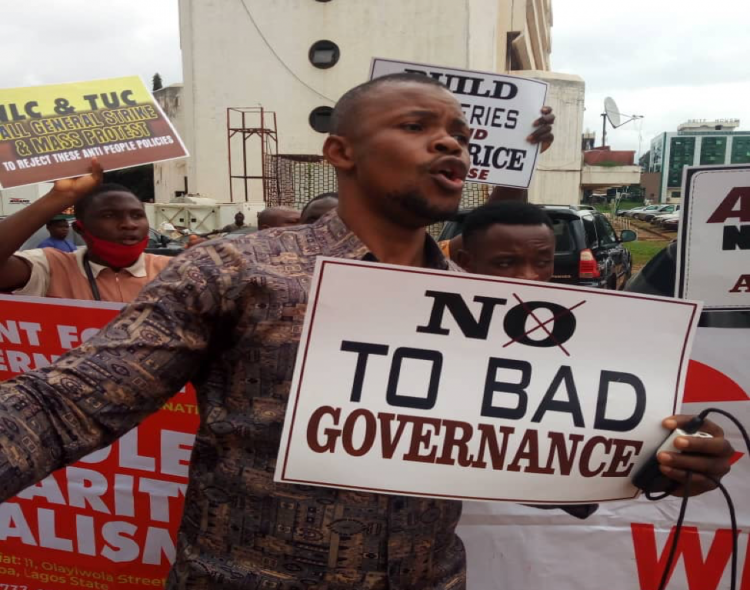
As Nigeria marked its 60th Independence Anniversary on October 1 this year, the Civil Rights Council (CRC) established by Social Development Integrated Centre, SOCIAL ACTION, commemorated the nation’s history with a protest march to draw attention to the surreptitious hike in fuel price and electricity tariffs across the country. It will be recalled that the Nigerian economy experienced a decline, following the COVID-19 lockdown, and many Nigerians faced biting hardship as a result. Amidst these occurrences, the Federal Government suddenly announced an increment in tariff of essential commodities such as Electricity and Premium Motor Spirit (PMS). The inflation in the cost of these commodities had negative impacts on other essential services and inevitably increased daily cost of living. This generated reactions from organized labour and Civil Society groups in Nigeria, leading to a national debate and call for mass action in the country. CRC galvanized its structures to participate in this national debate and to initiate a mass protest on the Nation’s Independence Day Anniversary.
Under the current administration of President Muhammadu Buhari, the pump price of petrol has witnessed a steady and unprecedented increase from ₦121 per litre in June 2020, to over ₦143 in July 2020, ₦150 in August 2020, and now sells for as high as ₦162 in October, 2020. Electricity tariffs were also increased by the Nigerian Electricity Regulatory Commission, NERC, from about ₦30.23 per kwh (kilowatt unit of energy per hour) to as much as ₦62.33 per kwh. Although the hike in the cost of electricity tariff was temporarily reversed for two weeks by the government, following the intervention of the Nigeria Labour Congress, NLC, there is a likelihood that the increment could be implemented at the expiration of the two-week period. CRC wishes to state unequivocally, that such an increment is totally unacceptable and should be resisted by all Nigerians.
Protesters addressing the media during the street protest organised by SOCIAL ACTION’s CRC
Prior to the October 1 protests, CRC had organised a press conference expressing support on the need to agitate for a reversal of these price increments. The press conference was held in Abuja with staff of SOCIAL ACTION, CRC and representatives of other civil society organisations in attendance.
Press Conference in Abuja with staff of SOCIAL ACTION, CRC and other civil society groups
The CRC units in Rivers State, Cross River State, Delta State and the Federal Capital Territory, Abuja, with their affiliates, mobilised Nigerian citizens in a peaceful march across various States.
CRC therefore condemns the harassment and brutalisation of several civil society actors, students and journalists who were arrested by the Nigeria Police following a series of demonstrations across the country, against the petrol price and electricity tariff increment. It is within the rights of Nigerian citizens to publicly express displeasure with the insensitive policies of the government which are glaringly inimical to the wellbeing of the Nigerian masses. The needless harassment of patriotic citizens protesting the hike in fuel and electricity costs, portrays the Buhari-led government in bad light. It is undemocratic for such well-meaning citizens to be arrested on account of their legitimate stance against the suppressive and draconian policies of the government. The Nigerian Police ought to know that the people have the right to hold the government accountable by demanding for good governance and better standards of living.
It is sad to note that governance in Nigeria continues to fall short of expectation. The country is currently grappling with an alarming debt stock of ₦31 Trillion (as of June 2020) and with 72% debt-service to revenue ratio, there is little left for the much-needed infrastructural development across all sectors, which is key to stimulating productivity and improving living standards. Yet, the country continues to operate an expensive bi-cameral legislature. Humongous funds are expended in the daily running of the government and its over-bloated workforce. The government ought to formulate policies that are focused on reducing the high cost of governance, protecting jobs, preserving investments and improving the economy of the country, rather than seeking to implement policies that could plunge more Nigerians into extreme poverty.
Most Nigerians are yet to recover from the economic downturn occasioned by the COVID-19 pandemic. Many lost their jobs or experienced a drastic drop in personal income, owing to the pandemic. It is therefore ill-timed and highly insensitive for the government to initiate policies that could bring more suffering upon the people, no matter the reasons proffered by the government as justification for the anti-people policies.
The Nigerian government needs to expedite action in revamping the moribund oil refineries in the country, and establish modular refineries as well. After several decades of importing refined petroleum products, it is high time the oil-rich nation, popularly referred to as the ‘giant’ of Africa, began to refine as much of its crude oil as is needed to meet local demand, rather than exporting it and placing the burden of these exports on the masses who are made to pay exorbitant prices to purchase the imported, refined products.



